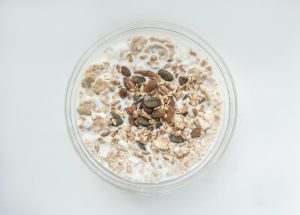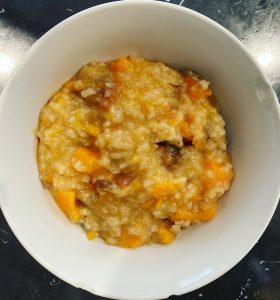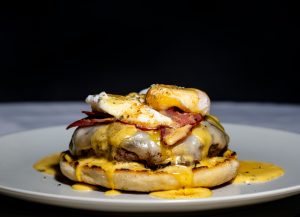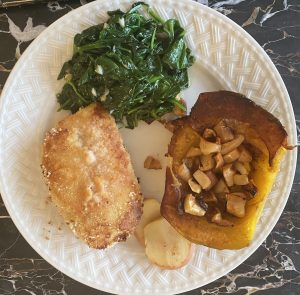Weight Loss
Transitioning from Summer to Fall

Although it remains deftly hot and humid, according to the traditional calendar and evidenced in the shorter days and longer nights, we now find ourselves in the transition between summer to autumn.
Summer corresponds with the heart and central nervous system, autumn with the lungs and immunity, but each quarterly transition of the seasons corresponds with the gut and microbiome, thereby further underscoring the importance of digestion in engendering all other organ systems. This one might be most directly significant, as in Chinese medicine’s cycle of the five elements earth is “mother to” metal, which is to say the stomach is primarily connected to pulmonary health. Anyone who’s ever suffered with an asthma attack due to dairy consumption or sleep apnea due to a weight problem can attest.
To compile the challenges posed by American diets and grocery options, we are simultaneously confronted with the humidity, which might further aggravate pre-existing dampness in one’s gut, depending on their constitution, diet, and body type. As always, I recommend going gluten, dairy, sugar, and alcohol free as much as possible.
To avoid gluten, there is always rice or great gluten free pasta brands now, such as Glutiniete. To avoid dairy, you can occasionally sprinkle nutritional yeast on foods and/or make vegan parmesan cheese with this simple recipe:
To avoid sugar I recommend increasing your tolerance for dark chocolates, and/or eating spoonfuls of nut butters with a touch of maple syrup or honey. If you must have alcohol, then vodka, tequila, mezcal, and organic wines are preferable. People often forget (especially when seeking a buzz) that grapes are always on the dirty dozen list, which means their inorganic versions are ridden with pesticides.
Those are a lot of DONT’s, I realize. As for DO’s:
- Eat a warm breakfast with protein: Eggs, oatmeals, congees, etc.
- Sweet potato, sweet potato, sweet potato! An excellent digestive aid and coming into season in fall. I like to roast them either with salt, pepper, and garlic, or cinnamon and maple syrup. For the latter I add sliced apples for my toddler in the last 15 minutes.
- Small amounts of fermented pickled foods, such as kimchi, sauerkraut, or pickles for their naturally occurring probiotics.
- Pu-Erh tea instead of green in the morning, also for its naturally occurring fermentation. Green tea, even when consumed hot, has a cold quality that can harm weak stomachs.
- Hot ginger, licorice, and/or barley tea in the evenings.
Finally, in our classical texts it is said that excessive standing harms the kidneys, excessive celebration harms the heart, and excessive sitting harms the stomach. What is meant by the latter is something the ancient Chinese understood and has only in recent generations become common knowledge in the west: sedentary lifestyles compromise metabolism. No matter how well we eat, it won’t much matter if we never get up and move.
Breakfast Congee Ideas

For anyone who is vegan, sensitive to eggs, or just dislikes them, here is a breakfast idea I’ve been experimenting with, both for the sake of variety and, well… experimentation.
In China, (white) rice congee is a common breakfast, often with egg and pickled vegetables, although I realize in the States rice is rather vilified for being a simple carb and high on the glycemic index. While this might be the case, it is also a food that is very gentle on the stomach and internal organs, which from our perspective aids in absorption and digestion, and in the proper dosages can be beneficial. However, for those who can’t get past the glycemic index, I recommend using quinoa, millet, or amaranth.
1 cup of your grain of choice
5 cups of liquid (if you’re going to make the sweeter, I recommend some kind of dairy-free milk—if you’re going for the probably healthier, more Oriental style I recommend just water or either vegetable, beef, or chicken broth) Oils don’t mix as well with the sweet flavors so if you’re making the sweeter version be sure to stir often so as to avoid sticking to the pot.
Boil and simmer about 15-25 minutes, or until it is the consistency of porridge.
Treat the sweet version like you would oatmeal: Top with berries, granola, as little maple syrup as you can discipline yourself to, cinnamon, and/or nuts if you like.
For the Asian version I recommend leftover vegetables and/or pickled cabbage or kraut. Plus, an over-easy or boiled egg if you want the best of all worlds.
Enjoy warm if possible! For those of us with babies or toddlers, we long for the days when we will return to eating hot food.
Whatever you eat, EAT BREAKFAST. I cannot stress this enough. They said breakfast is the most important meal of the day because it is, not because grandma said it, but because science and biology do. Here is a link to an NIH study correlating the skipping of breakfast with increased insulin resistance and risk for diabetes: https://www.ncbi.nlm.nih.gov/pmc/articles/PMC7246451/
I like coffee as much as anyone, but coffee alone (or with a piece of toast) is not breakfast. Protein and/or fat should be consumed, preferably in great quantity.
Nor do I doubt the potential benefits of intermittent fasting, but it is more biologically aligned to skip dinner—not breakfast. If this is impossible, maybe a later breakfast, like 9am? Supposedly, any longer than 2-3 hours after waking constitutes “skipping breakfast,” which is to say the insulin resistant mechanism is set in motion by that time.
If you have no appetite for breakfast this probably indicates your dinner being not fully digested and some metabolic syndrome at work. Please reach out—or try licorice and/or ginger tea 🙂
Sweet Potato Congee for Winter
 Happy New Year, all! As we continue through one of the worst cold and flu seasons in recent memory, 2020 notwithstanding, I’ll begin with a recipe.
Happy New Year, all! As we continue through one of the worst cold and flu seasons in recent memory, 2020 notwithstanding, I’ll begin with a recipe.
Sweet potato congee with red dates, honey added if desired (and who won’t?):
1 large chopped sweet potato
1 cup of rice, rinsed please
8 cups of water
10-30 grams of red dates sliced open (closer to 10g if you have a “damp heat” body type or pathology—closer to 30g if you are the frail and pale type with tendency to insomnia and/or heart palpitations).
Bring to boil and simmer uncovered for about 40 minutes, or until the consistency is as above, like a porridge. In Asia most people take it a bit more watery than this, but either way is fine. Plate and drizzle honey on top to taste.
Although white rice is mostly vilified by Western dietitians, in Eastern Medicine we believe that the gentle support it provides to the internal organs is imperative for optimizing the absorption of all accompanying ingredients, also at generating the healthy stomach fluids needed for digestion. Without strong metabolism we cannot build blood or create nutrients. Without blood we cannot live—more relevant, with subjectively deficient blood all of our parasympathetic functioning may weaken and we may flirt with anemia.
If you are strongly averse to (white) rice, you can absolutely try making this with quinoa, millet, or farro. Risotto or orzo, unfortunately, will not work.
The Eastern Medical diet is somewhat diametrically opposite to that of raw vegans. Besides encouraging at least small amounts of animal protein, we believe the best way to optimize health is through low, slow, and long cooking of foods to extract all nutrients into the dish and make them easy for our guts to process. Anything cold or damp, such as ice, sugar, or alcohol should at least wait until after the food has been consumed and processed for at least 15-30 minutes whenever possible. Which means all of our mothers were correct in echoing the concept of not “spoiling our dinner” by having sweets first. The adult parallel to this might be cautioning to limit drinks before dinner.
Sweet potatoes are an excellent “tonic” for the stomach qi in Winter, and red dates are actually one of the most important herbs in all of Chinese Medicine, appearing in a large percentage of classical formulas, with the intention of protecting the healthy stomach fluids and nourishing blood of the heart. I recommend making this recipe, storing leftovers in the fridge, and eating 2-3 times a week in winter. To reheat just add plenty of water to keep consistency.
Hope all are warm and healthy!
What are We Actually Craving, in Our Cravings?
 Why do many women crave chocolate or dairy more while on their menses? Why do men generally crave beer more than women? Why do some people crave sweets more at night, or wake up in the morning feeling everything from ravenous to having no appetite at all? And how do these tendencies influence future tendencies within our bodies?
Why do many women crave chocolate or dairy more while on their menses? Why do men generally crave beer more than women? Why do some people crave sweets more at night, or wake up in the morning feeling everything from ravenous to having no appetite at all? And how do these tendencies influence future tendencies within our bodies?
Western medicine has no clue—“some people are just like that,” they shrug, or my personal favorite: “That’s normal (as you get older).” Without an intricate understanding of the paradigm of internal (Chinese) medicine, unique preferences and/or habits can be difficult to explain, hence impossible to change.
“I just have a sweet tooth,” people say, which is an expression. What if your will power was not entirely psychological, but partially a result of the state of your internal organs, making it much harder for you to resist temptation than others?
Dryness is an epidemic. It stands to reason in a society that over-prioritizes the yang, masculine energy. While yin is represented by rest, stoppage, sleep, coolness and moisture, yang is work, working out, going out, staying out late, everything out; burning it at all ends, not to mention excessive caffeinated diuretics and overly seasoned or spicy foods.
In Chinese Medical terms stress “depletes the healthy body fluids,” as do NSAIDS, most meds, skipping breakfast, poor sleep, overwork, over-working out, or excessive masturbation. Unfortunately, these are not fluids that can be supplemented through hydration. While it’s great to hydrate, from our perspective this loss is of metabolic/organ fluids that can be restored only through proper rest, herbal medicine, and diet, namely eggs and red meat.
In the meantime, whether consciously or not, we are all craving the ultimate yin. Think breastfeeding: An opportunity to stop everything, be comforted and nuzzled by some soft, fatty, support structure, nourished by its sweet, thick, delicious juice. Since few of us have that opportunity, we opt instead for ice cream or cheese, boba tea, or some delectable hazy IPA—anything thick, sweet, and nurturing in lieu of the adult version of nursing, which might be an early bedtime after a relaxing day. Imagine that. Do we deserve such a thing?
“Nighttime belongs to the blood,” is an expression in Classical Medicine that refers to our healthy body fluids being in charge of evening operations, whereas cellular energy and sympathetic manage the day hours. When a symptom, such as sweet cravings, is worse at night, it further confirms fluid deficiency as part of its etiology. What many women are craving during their cycle, is frankly, more blood. Most don’t have the opportunity to necessarily get more rest, eat more red meat or go to sleep earlier (though if you do, you should!). Instead, they reach for sweets and/or dairy to temporarily satiate the desire to supplement yin. Unfortunately, in doing so this creates more dampness in the microbiome, which makes it harder for the organs to then convert future foods into healthy nutrients, which causes more cravings, and so on. Healthier options for sticky, yin-nourishing substances might be nut butters, smoothies, non-dairy yogurts, or baked apples with some honey.
“Yin-nourishing herbs” are damp. I always think of the foxglove root, one of the most herbs in our pharmacopeia, which looks, but does NOT at all taste like a chocolate brownie. It is rare to meet a patient, man or woman, who does not need some amount of foxglove to supplement lost fluids; although it is even more rare to meet someone whose gut is ready for it. Foxglove is thick and heavy, like boba tea or breastmilk, so if someone has weak digestion, loose stools, acid reflux, etc. it is probably not ideal for them. It is important in our “moments of weakness” to access at least enough will power to reach for healthier alternatives enough of the time, so as to protect our gut health—so that one day our herbalist will give us the green light to truly nourish our yin organ fluids with brilliant substances like foxglove.
How to Design Meals like Medicinal Formulas
 If food is medicine then creating each meal should be a bit like writing your own herbal formula. Whenever possible, it should be as agreeable as possible with our unique physiology, though this is admittedly challenging when cooking for a family where everyone has different body types. Nevertheless, one part of each meal should complement the other parts, either through synergistic benefit or offsetting its potentially detrimental qualities.
If food is medicine then creating each meal should be a bit like writing your own herbal formula. Whenever possible, it should be as agreeable as possible with our unique physiology, though this is admittedly challenging when cooking for a family where everyone has different body types. Nevertheless, one part of each meal should complement the other parts, either through synergistic benefit or offsetting its potentially detrimental qualities.
As a longstanding, traditional example, any time we get Thai or Mexican food, it is served with cucumber or radishes, respectively, which are there to mitigate the side effects of the spice.
Most foods are good, but almost all of them have “side effects.” Red meat nourishes the body’s blood, yin, and qi, but if it were an herb it would be a bit warm and damp. Too much red meat and/or red meat that is not harmonized by the remainder of the meal can create damp heat, or inflammation in the stomach and intestines. Then again too little red meat can cause a deficiency of blood, yin, and qi. Ideally red meat (and pork) would be consumed alongside steamed vegetables, then followed by hot green tea, either after the meal or the following morning (green tea at other times and/or for vegetarians is thought to have a bit too cooling, or vasoconstrictive effect on the microbiome—for them black teas are preferable).
Carbohydrates are settling for both the stomach and the mind—probably why they give us such immediately pleasure—but they are obviously stickier foods, “damper” foods, which are more difficult to digest. For this reason whenever possible, it is best to eat them warm and cooked, and alongside more acrid spices in the meal, such as basil, rosemary, ginger, garlic, or onion. While I am Jewish and from New York, and love a great tuna on a bagel, there is a remarkable difference in the physiological response to cold tuna on bread versus cooked pasta with garlic and oil, maybe vegetables and cannelini beans. Yum!
Salads. Oh boy, do westerners love salad. Frankly, if you tend to any digestive problems whatsoever, raw foods should be avoided as much as possible, but if you must:
Consume salad more in summer—less in winter—and always alongside some cooked protein and/or ginger tea. The acridity of the ginger should help to warm the stomach to digest the raw foods. The protein should provide warmth, plus some much needed calories, or “qi and yin.”
Cooked vegetables, allergies notwithstanding, are probably the only perfect food that wholly lack side effects, which is probably why they are also the one food that nearly every paradigm of medicine agrees upon. If you don’t consume cooked vegetables daily you are on a dangerous path, in my opinion. They are nearly always harmless and beneficial… yet still ultimately inadequate, as we can only imagine the metabolic fatigue and inevitable illnesses to come were someone to consume exclusively vegetables.
Food is a gentle medicinal. It will neither heal nor destroy us quickly on its own, however it will always do one or the other over time. I’ve seen firsthand, in myself, loved ones, and patients eradicate chronic symptoms by pursuing a more Eastern diet, though it took many months—in my case years! People should not get discouraged by eating well for a particular interim and not feeling dramatically better. Instead, pay attention to whether you feel worse (always a possibility), meanwhile recognizing that without internal medicine, diet alone may take a long time to cure disease. It is up to us to continue to better understand the nature of each food, so that we can wisely design the perfect “herbal formula” three times a day until the end of time.
Pictured above is an imperfect, but still great meal: Breaded chicken cutlet, sauteed spinach, and roasted acorn squash with roasted apples, cinnamon, and maple syrup. What is “imperfect” about it? First, fruit should be consumed at least 15 minutes apart from other foods so as to avoid creating its notoriously mucus-like congestion in the microbiome. Also, “natural” or not, let’s be honest: maple syrup is sugar; and chicken is healthier without breadcrumbs. On the other hand, breadcrumbs make up a very small amount of the meal, the apples are at least cooked, hence easier to digest, and the leafy greens with garlic should help to optimally process the meat and sugars.


